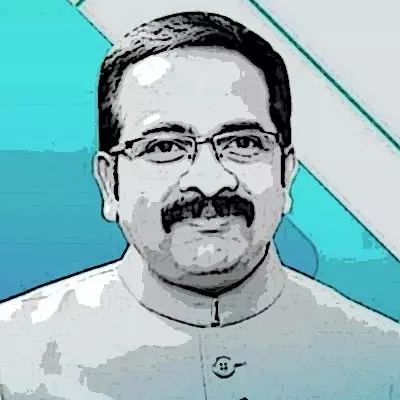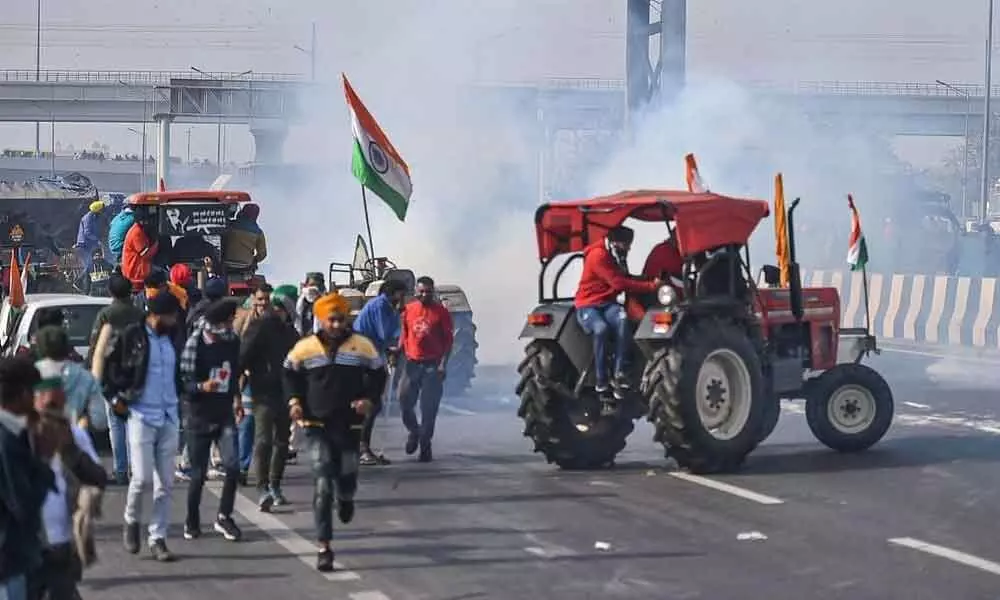Live
- 3 energy efficient projects to reduce power bills in AP
- Governor Jishnu Dev Varma to Attend ABVP 43rd State Conference in Siddipet Today
- Transgenders to Begin Traffic Assistant Duties in Hyderabad from Tomorrow
- Police Security Tightened at Allu Arjun’s Residence After OU JAC Vandalism
- ED Likely to Issue Notices to BRS Working President KTR Today
- CM Chandrababu Naidu to Attend Christmas Celebrations in Amaravati Today
- CM Revanth to Review Projects with Senior Officials Today
- Fix Ozone Layer Depletion
- Harish Rao to Visit Medak Today for Centenary Celebrations
- Irregularities in TUDA under vigilance scanner
Just In
Violence is crime, protest is not


Violence is crime, protest is not
Any form of violence in a structured and functional democracy is a crime, but protest is not. In a parliamentary democracy protest and expression of...
Any form of violence in a structured and functional democracy is a crime, but protest is not. In a parliamentary democracy protest and expression of dissent is fundamental to the functioning of a state. In India, the Constitution provides for right to free speech and expression. Article 19 (1) (a) provides for Right to Express subject to reasonable restriction. Peaceful protest is a constitutional right in India and it should be used with reasonable restraint.
Few farmer groups have initiated a dissent programme for the last two months at the Delhi borders, which were peaceful and democratic until the other day. The conduct of Modi government was exemplary, which did not consider those protesting as obstructionists. The government has exhibited unprecedented restraint in the last two months, even as protesters blocked the vital roads leading to the national capital. The long-drawn blockades have not just created massive financial losses due to clogged logistics and transportation for many businesses, but also caused serious inconvenience to the general public.
Modi Government has been proactive in engaging with the protesting farmer groups since the initial days of their protest. Over ten lengthy negotiation meetings were organised to thaw out differences and to discuss farmers concerns on the newly reformed farm laws. Senior Ministers like Narendra Singh Tomar and Piyush Goyal were engaging with farmer leaders in all these negotiations.
During multiple engagements with farmer union leaders, Modi government has agreed on many demands raised by farmer groups since November 2020. In fact, every time the government would agree and concede to the farmer unions demands, farmer unions would come up with different demands than stated earlier and keep changing their goal posts. Modi government has been responsible and patient all along.
It has even announced few days back, that it was ready to keep the new farm laws on hold for one and half years, till a Supreme Court directed committee presents their report. None of these concessions from government's end seem to satisfy farmer groups, who are persisting on complete roll-back of the newly implemented farm laws.
Negotiations don't work this way. Any legitimate negotiation should lead to a final resolution through concessions from both sides, for a fair outcome. An effective negotiation process should ensure a win-win for both parties in the negotiation, at least it should ensure all parties feel that way eventually.
However, the negotiations with farmer groups so far, were unusually one-sided, where government is extending all concessions and farmer unions are extending none. Negotiations like this rarely succeed and culminate in a win-win situation. As I analyse, below are the three big mistakes made by farmer unions, which have led their protests into a wrong-track and a 'point-of-no-return':
Violence yields zero results
Mahatma Gandhi was a smart protester while he led the freedom fight for India. He had formulated a success formula for protests and coined it as 'Non-violent protests', which had found traction to fight a long battle with British for freedom, but also has become a successful model for protests across the world for individual and national rights. Mahatma Gandhi understood very early in time that violence defeats the very purpose of a protest and side-tracks the central objective, and allows the opponent to besmirch.
In a structured democracy, protest is the fundamental instrument of dissent. However, this instrument cannot be used to unleash civic disorder, violence, vandalism and desecration. In a constitutional democracy, where law and order have laws protecting its enforcement, violent protests yield 'zero results'.
Farmer unions have made a biggest mistake in allowing a peaceful dissent programme derail into violence, vandalism and desecration of a national monument and its historic pride. They have actually lost the cause by losing out on their non-violent, peaceful-protest track. More importantly they have lost the massive rising support base, across India for their protest. Most of what they have lost, is irrevocable.
Leadership deficit exposed
Leadership is all about accountability. It's about owning up action and its consequences. The unruly episode of mayhem on the Republic Day in Delhi, has exposed lack of credible leadership for the protests.
If agreements are not respected, leadership has no meaning. Modi government has given permission to the farmers tractor-rally despite January 26 being a land mark national event. Farmers unions and its leaders [if they are any] should have respected it and carried out their rally peacefully. It would have strengthened their cause, if they actually had any real-cause.
The objective of protest has no correlation to the unprovoked vandalism and violence by the protesting farmer groups on the Republic Day.
One uncontrolled event is enough to highlight the lack of a sincere and common objective for a protesting group. The protest has visibly been hijacked by anti-social, anti-national, opportunist political and separatist elements. It was there on TV screens all day for every one across the nation to see. The shocking rampage and unprovoked physical attacks on police have exhibited the wrong-tracking of the farmers protest, without any credible leadership leading it in the right direction.
Leadership deficit is fatal for any protest.
Negotiations can't continue
Who should government engage in discussions with in future? Where is the credibility of farmer-union leaders? What is the guarantee of implantation of agreed resolution, when leaders have zero control over protesting groups? These are some questions government will ponder, before they invite anyone for further discussions, as I see.
If protesters lose focus of their core objective, there is nothing credible to discuss for the other party, in this case the government. Nothing justifies the reason and purpose of the scale of violence and vandalism unleashed by the protestors on that infamous day. The deviant anti-social behaviour has no co-relation to the objective of farmers protest in the first place.
The consequences of shunning responsibility are quite expensive for leadership, and farmer union leaders are no exception. Lack of control and accountability lowers the power of leadership.
It is time for the protesting groups to accept the resolution offered in the last negotiation meeting with the central government and return home to re-engage with their occupation, instead of continuing with their protest which has lost its cause, objective, purpose and credibility.
(The author is the chief spokesperson of the BJP Telangana State, an organisational strategist & a leadership coach)

© 2024 Hyderabad Media House Limited/The Hans India. All rights reserved. Powered by hocalwire.com






